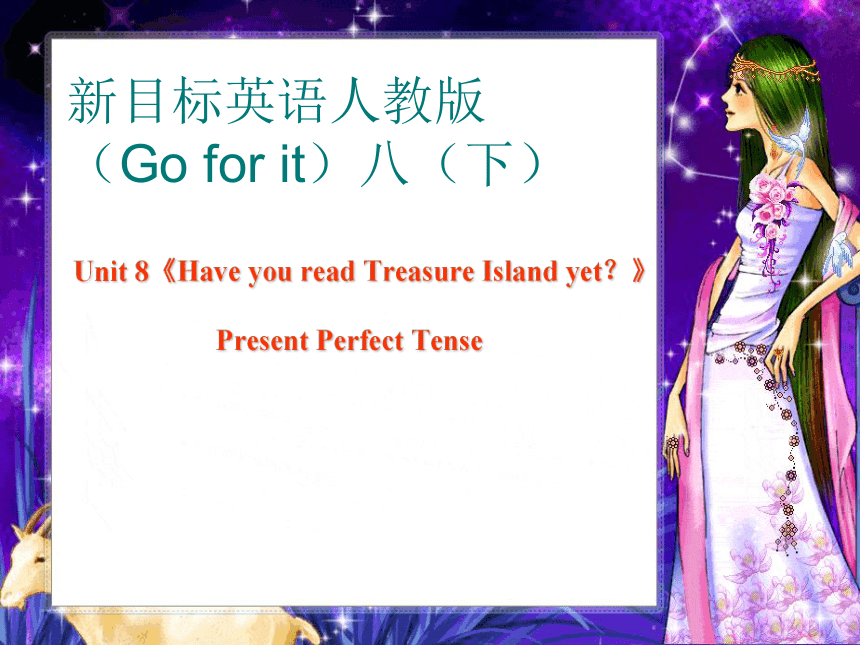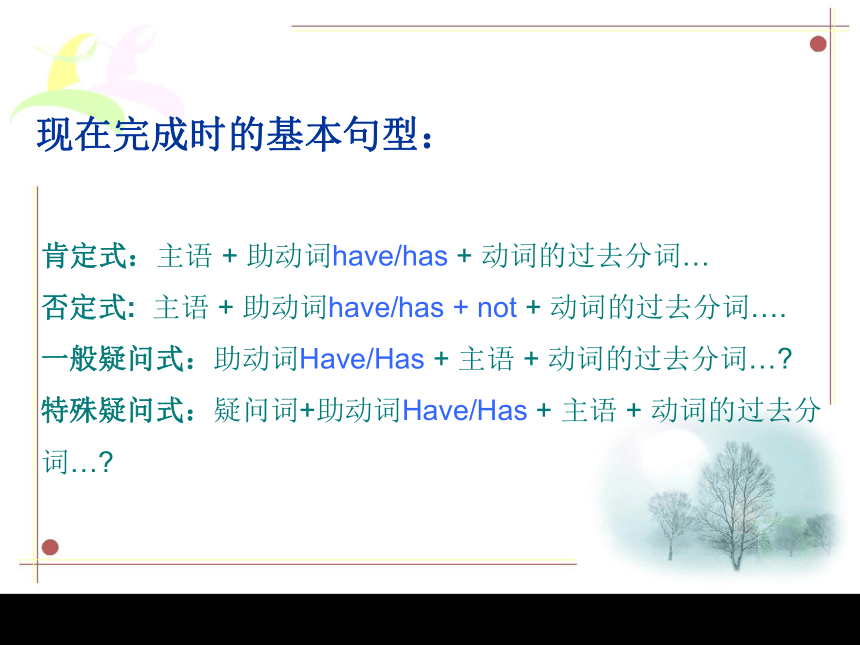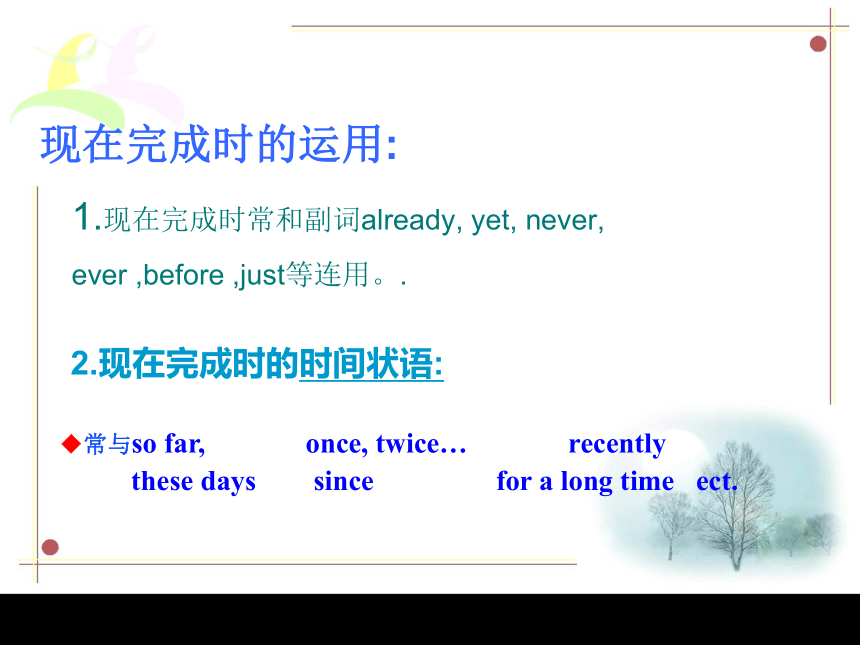Unit 8 Have you read Treasure Island yet?Section A Present Perfect Tense 课件(共11张PPT)
文档属性
| 名称 | Unit 8 Have you read Treasure Island yet?Section A Present Perfect Tense 课件(共11张PPT) |  | |
| 格式 | ppt | ||
| 文件大小 | 611.5KB | ||
| 资源类型 | 教案 | ||
| 版本资源 | 人教新目标(Go for it)版 | ||
| 科目 | 英语 | ||
| 更新时间 | 2022-04-06 20:40:58 | ||
图片预览





文档简介
(共11张PPT)
Unit 8《Have you read Treasure Island yet?》
Present Perfect Tense
新目标英语人教版
(Go for it)八(下)
Present perfect tense 现在完成时
用法一:
表示过去发生的某一动作对现在造成的影响或产生的结 果.现在完成时这一时态强调是过去动作与现在的联系,也就是强调现在的影响和结果.
have/has + 过去分词
构成:
不规则变化规律:
AAA : hurt-hurt-hurt hit-hit-hit
AAB : beat-beat-beaten
ABA : run-ran-run come-came-come
ABB : keep-kept-kept find-found-found
ABC : grow-grew-grown hide-hid-hidden
动词的过去分词:
规则变化(和过去时一样)ABB; 不规则变化(特殊记)
现在完成时的基本句型:
肯定式:主语 + 助动词have/has + 动词的过去分词…
否定式: 主语 + 助动词have/has + not + 动词的过去分词….
一般疑问式:助动词Have/Has + 主语 + 动词的过去分词…
特殊疑问式:疑问词+助动词Have/Has + 主语 + 动词的过去分词…
现在完成时的运用:
1.现在完成时常和副词already, yet, never, ever ,before ,just等连用。.
2.现在完成时的时间状语:
◆常与so far, once, twice… recently
these days since for a long time ect.
1. I ________ (have) lunch already.
2. Has the train_______ (arrive), yet
3.Tom ____ never_______ (be to ) China.
4. The twin ______just _____(see) my father.
5. The twins ____(see) my father just now.
6. Many tall buildings ____________ (build) in the past 5 years.
have had
arrived
has
been to
has
seen
saw
have been built
现在完成时与一般过去时的用法比较
一般过去时,则只讲述发生在过去的动作和事情与现在没有关系。
现在完成时表示过去的动作一直延续到现在甚至会继续下去或表示过去的动作对现在造成的影响;一般过去时表示动作发生的时间在过去。现在完成时属于现在时态范围,因此,不能和表示过去的时间状语连用。 如:yesterday, last night, two weeks ago等
past
present
I lived there 2 years ago
I have lived here for two years
试比较:
The plane has arrived . 飞机已经来了。
(说明现在的情况:飞机在这儿)
The plane arrived a quarter ago. 飞机是一刻钟以前来的。(强调动作发生的时间在过去)
I have taught here for fifteen years.
我在这儿已经教了十五年。
(表示十五年前的动作一直延续到现在,还可能会继续。)
I taught here for a year. 我过去在这儿教过一年。
(表示“我“现在已经不在这儿任教了)
Put the following sentences into English.
A: 火车已经开走了.
B: 什么时候开走的
A: 半个小时之前开走的.
A: 这本书我已经买了两年了.
B: 你在哪儿买的
A: 在我老家买的.
3. A: 你看过这部电影吗
B: 看过.
A: 什么时候看的.
B: 上周星期天看的.
A: The train has left.
B: When did it leave
A: It left half an hour ago.
A: Have you seen the film
B: Yes, I have.
A: When did you see it
B: I saw it last Sunday.
A: I’ve had the book for two years.
B: Where did you buy it
A: I bought it in my hometown.
翻译下列句子:
1. 你曾经吃过鱼和薯条吗?
2. 我刚刚丢了我的语文书。
3. 我以前从来没去过那个公园。
4. 他已经吃过午饭了。
5. 你已经看过这部电影了吗?
6. 我哥哥还没回来。
1.Have you eatten fish and chips/ french fries
2.I have lost my Chinese book.
3 I have never been to that park.
4.He has already had lunch.
5 Have you seen this movie yet
6 My brother has not returned.
Unit 8《Have you read Treasure Island yet?》
Present Perfect Tense
新目标英语人教版
(Go for it)八(下)
Present perfect tense 现在完成时
用法一:
表示过去发生的某一动作对现在造成的影响或产生的结 果.现在完成时这一时态强调是过去动作与现在的联系,也就是强调现在的影响和结果.
have/has + 过去分词
构成:
不规则变化规律:
AAA : hurt-hurt-hurt hit-hit-hit
AAB : beat-beat-beaten
ABA : run-ran-run come-came-come
ABB : keep-kept-kept find-found-found
ABC : grow-grew-grown hide-hid-hidden
动词的过去分词:
规则变化(和过去时一样)ABB; 不规则变化(特殊记)
现在完成时的基本句型:
肯定式:主语 + 助动词have/has + 动词的过去分词…
否定式: 主语 + 助动词have/has + not + 动词的过去分词….
一般疑问式:助动词Have/Has + 主语 + 动词的过去分词…
特殊疑问式:疑问词+助动词Have/Has + 主语 + 动词的过去分词…
现在完成时的运用:
1.现在完成时常和副词already, yet, never, ever ,before ,just等连用。.
2.现在完成时的时间状语:
◆常与so far, once, twice… recently
these days since for a long time ect.
1. I ________ (have) lunch already.
2. Has the train_______ (arrive), yet
3.Tom ____ never_______ (be to ) China.
4. The twin ______just _____(see) my father.
5. The twins ____(see) my father just now.
6. Many tall buildings ____________ (build) in the past 5 years.
have had
arrived
has
been to
has
seen
saw
have been built
现在完成时与一般过去时的用法比较
一般过去时,则只讲述发生在过去的动作和事情与现在没有关系。
现在完成时表示过去的动作一直延续到现在甚至会继续下去或表示过去的动作对现在造成的影响;一般过去时表示动作发生的时间在过去。现在完成时属于现在时态范围,因此,不能和表示过去的时间状语连用。 如:yesterday, last night, two weeks ago等
past
present
I lived there 2 years ago
I have lived here for two years
试比较:
The plane has arrived . 飞机已经来了。
(说明现在的情况:飞机在这儿)
The plane arrived a quarter ago. 飞机是一刻钟以前来的。(强调动作发生的时间在过去)
I have taught here for fifteen years.
我在这儿已经教了十五年。
(表示十五年前的动作一直延续到现在,还可能会继续。)
I taught here for a year. 我过去在这儿教过一年。
(表示“我“现在已经不在这儿任教了)
Put the following sentences into English.
A: 火车已经开走了.
B: 什么时候开走的
A: 半个小时之前开走的.
A: 这本书我已经买了两年了.
B: 你在哪儿买的
A: 在我老家买的.
3. A: 你看过这部电影吗
B: 看过.
A: 什么时候看的.
B: 上周星期天看的.
A: The train has left.
B: When did it leave
A: It left half an hour ago.
A: Have you seen the film
B: Yes, I have.
A: When did you see it
B: I saw it last Sunday.
A: I’ve had the book for two years.
B: Where did you buy it
A: I bought it in my hometown.
翻译下列句子:
1. 你曾经吃过鱼和薯条吗?
2. 我刚刚丢了我的语文书。
3. 我以前从来没去过那个公园。
4. 他已经吃过午饭了。
5. 你已经看过这部电影了吗?
6. 我哥哥还没回来。
1.Have you eatten fish and chips/ french fries
2.I have lost my Chinese book.
3 I have never been to that park.
4.He has already had lunch.
5 Have you seen this movie yet
6 My brother has not returned.
同课章节目录
- Unit 1 What's the matter?
- Section A
- Section B
- Unit 2 I'll help to clean up the city parks.
- Section A
- Section B
- Unit 3 Could you please clean your room?
- Section A
- Section B
- Unit 4 Why don't you talk to your parents?
- Section A
- Section B
- Unit 5 What were you doing when the rainstorm came
- Section A
- Section B
- Review of Units 1-5
- Unit 6 An old man tried to move the mountains.
- Section A
- Section B
- Unit 7 What's the highest mountain in the world?
- Section A
- Section B
- Unit 8 Have you read Treasure Island yet?
- Section A
- Section B
- Unit 9 Have you ever been to a museum?
- Section A
- Section B
- Unit 10 I've had this bike for three years.
- Section A
- Section B
